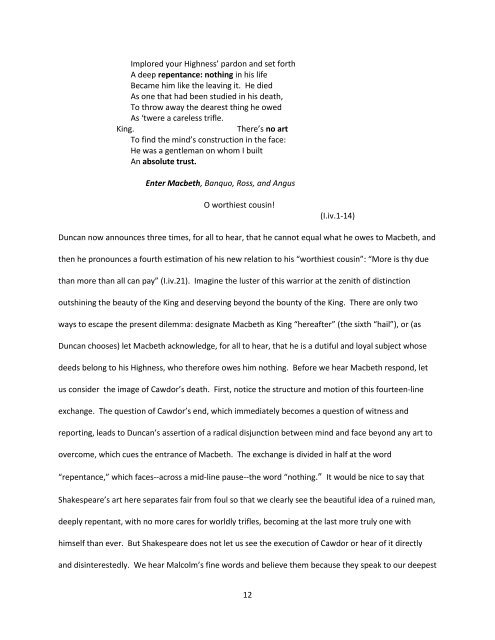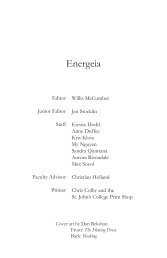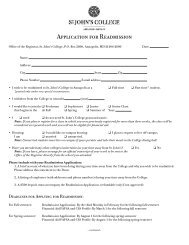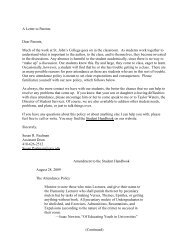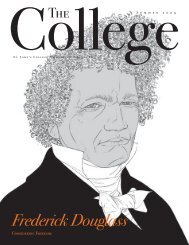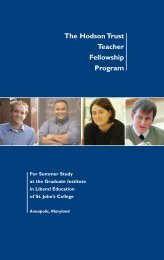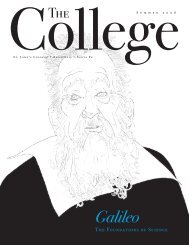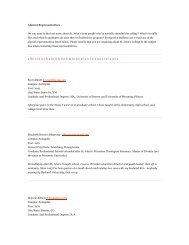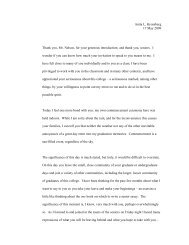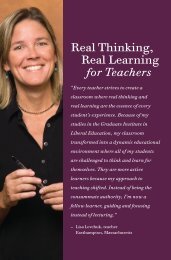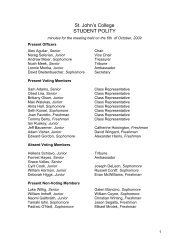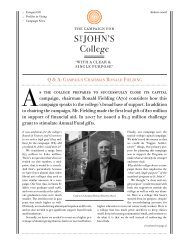âTo Meet with Macbeth,â given by tutor Louis ... - St. John's College
âTo Meet with Macbeth,â given by tutor Louis ... - St. John's College
âTo Meet with Macbeth,â given by tutor Louis ... - St. John's College
Create successful ePaper yourself
Turn your PDF publications into a flip-book with our unique Google optimized e-Paper software.
Implored your Highness’ pardon and set forth<br />
A deep repentance: nothing in his life<br />
Became him like the leaving it. He died<br />
As one that had been studied in his death,<br />
To throw away the dearest thing he owed<br />
As ‘twere a careless trifle.<br />
King.<br />
There’s no art<br />
To find the mind’s construction in the face:<br />
He was a gentleman on whom I built<br />
An absolute trust.<br />
Enter <strong>Macbeth</strong>, Banquo, Ross, and Angus<br />
O worthiest cousin!<br />
(I.iv.1-14)<br />
Duncan now announces three times, for all to hear, that he cannot equal what he owes to <strong>Macbeth</strong>, and<br />
then he pronounces a fourth estimation of his new relation to his “worthiest cousin”: “More is thy due<br />
than more than all can pay” (I.iv.21). Imagine the luster of this warrior at the zenith of distinction<br />
outshining the beauty of the King and deserving beyond the bounty of the King. There are only two<br />
ways to escape the present dilemma: designate <strong>Macbeth</strong> as King “hereafter” (the sixth “hail”), or (as<br />
Duncan chooses) let <strong>Macbeth</strong> acknowledge, for all to hear, that he is a dutiful and loyal subject whose<br />
deeds belong to his Highness, who therefore owes him nothing. Before we hear <strong>Macbeth</strong> respond, let<br />
us consider the image of Cawdor’s death. First, notice the structure and motion of this fourteen-line<br />
exchange. The question of Cawdor’s end, which immediately becomes a question of witness and<br />
reporting, leads to Duncan’s assertion of a radical disjunction between mind and face beyond any art to<br />
overcome, which cues the entrance of <strong>Macbeth</strong>. The exchange is divided in half at the word<br />
“repentance,” which faces--across a mid-line pause--the word “nothing.” It would be nice to say that<br />
Shakespeare’s art here separates fair from foul so that we clearly see the beautiful idea of a ruined man,<br />
deeply repentant, <strong>with</strong> no more cares for worldly trifles, becoming at the last more truly one <strong>with</strong><br />
himself than ever. But Shakespeare does not let us see the execution of Cawdor or hear of it directly<br />
and disinterestedly. We hear Malcolm’s fine words and believe them because they speak to our deepest<br />
12


